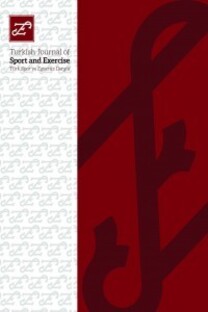A research on self-efficacy beliefs, perception of success, competitive state anxieties of 9-13-year-old children playing soccer
The purpose of this research is to evaluation self-efficacy beliefs, perception of success and competitive state anxieties of the children that participated in youth academy selections of Anatolia University Soccer Team. In this research, totally 152 children (Age, mean: 11 ± .755) were classified in two groups as the qualified (N: 108, Age, mean: 11.02 ± .736) and the disqualified (N: 44, Age, mean: 10.95 ± .806). SES, POSQ-CH, CSAI-2C and SCAT-C were used as data collection tools in the research. The Correlations Analysis and MANOVA were employed to analyse the research data. In consequence of the conducted analysis, there is not a meaning difference (p>.05) among the scores of competition trait anxiety, competitive state anxiety sub-dimension and perception of success in sports sub-dimension between the qualified and the disqualified groups. There is a considerable difference between the self-efficacy scores of both groups (p<.05). Additionally, there is a significant negative correlation between competition trait anxiety and self-efficacy, between cognitive anxiety and self-efficacy, between cognitive anxiety and task orientation, between cognitive anxiety and task orientation and between physical anxiety and self-efficacy, physical anxiety and task orientation and between physical anxiety and ego orientation. Consequently, when selection criteria of 9-13 year-old children playing soccer are taken into consideration, only self-efficacy beliefs among the variables mentioned in this study between the qualified and the disqualified made a difference, whereas other variables did not make any differences. Once again, some relationships appear between anxiety and competence levels and perception of success.
Keywords:
Perception of success Self-efficacy, state anxiety, trait anxiety,
___
- Anshel MH. Sport Psychology: From Theory to Practice, Arizona: Gorsuch Scarisbrick, Scottsdale. 1994
- Bandura A. Self-Efficacy Mechanismın Human Agency. American Psychologist, 1982; 37: 122–147.
- Bandura A, Cervonen D. Self evaluative and self efficacy mechanisms governing the motivational effects of goal systems. Journal of Personality and Social Psychology, 1983; 45: 1017-1028.
- Bandura A. Social foundations of thought and action: A social cognitive theory. Englewood Cliffs, NJ: Prentice Hall. 1986
- Bandura A. Social cognitive theory: An agentic perspective. Annual Review of Psychology2001; 52: 1–26.
- Bayar P, Koruç Z. Changes in Anxiety Components in Successful and Unsuccessful Conditions ın Volleyball and Self-Efficacy Relationship’. The 46th ICHPER. SD Anniversary World congress. İstanbul: 2005; 277-279.
- Bird AM, Cripe BK. Psychology and Sport Behaviour. St. Louis: Times Mirror/ Mosby College Publishing. 1986
- Glyn CR, Darren CT, Gloria B. Achievement goals in sport: The development and validation of the Perception of Success Questionnaire. Journal of Sports Sciences, 1998; 16:337-347
- Kazak Çetinalp Z. The validity and reliability study of "The Children's Version of the Perception of Success Questionnaire-POSQ-CH" for Turkish athletes. International Sport Sciences Congress3-5 November. Muğla 2006
- Kocaekşi S, Koruç Z. The Relationship between competitive state anxiety level and self efficacy beliefs of man handball players. The 46 the ICHPER-SD Anniversary World Congress, 2005; 205–206, İstanbul.
- Koruç Z. The effects of Autogenic exercises on athletes stress level before the competition. Ph.D. Thesis, Hacettepe University, Ankara. 1994.
- Koruç Z, Yılmaz V. Turkish Adaptation of the Competitive State Anxiety Inventory-Child Form: CSAI-2C. 10th. ICHPER-SD Europe Congress & the TSSA 17-20 November, Antalya, 2004.
- Koruç Z, Yılmaz V. Turkish Adaptation of A Children’s Form Of The Sport Competition Anxiety Test: SCAT-C. 10th. ICHPER-SD Europe Congress & the TSSA 17-20 November, Antalya. 2004.
- Leary MR. Self-presentational processes in exercise and sport. Journal of Sport & Exercise Psychology, 1992; 14: 339-351.
- Martens R, Vealey RS, & Burton D, Competitive anxiety in sport. Champaign, IL: Human Kinetics. 1990.
- Nicholls JG. The competitive ethos and democratic education. Cambridge, MA: Harvard University Press. 1989.
- Öcel H. The relationships between collective efficacy, self efficacy and cohesion with perception of success and expectations of team players, Phd thesis, Hacettepe University, Ankara, 2002.
- Öner N, LeCompte A. State and Trait Anxiety Questionnaire Handbook. İstanbul, Boğaziçi University Publications, 1985.
- Rainey DW &Cunningham H. Competitive trait anxiety in male and female college athletes. Research Quarterly for Exercise and Sport, 1988; 59 (3), 244-247.
- Riggs ML, Warka J, Babasa B, Betancour R, Hooker S. Development and Validation of Self-Efficacy and Outcome Expectancy Scales for Job-Related Applications, Educational and Psychological Measurement, 1994; 54: 793-802.
- Roberts GC, Ommundsen Y. Effects of achievement goal orientations on achievement beliefs, cognitions, and strategies in team sport. Scandinavian Journal of Medicine and Science in Sport, 1996; 6: 46-56.
- Roberts GC, Treasure DC, Balague G. Achievement goals in sport: Development and validation of the perception of success questionnaire. Journal of Sport Sciences, 1998; 16: 337–347.
- Scanlan TK, Passer MW. Sources of competitive stress in young female athletes. Journal of Sport Psychology, 1979; 1: 160-169
- Schunk DH & Rice JM. Learning goals and progress feedback during reading comprehension instruction. Unpublished manuscript, University of North Carolina, Chapel Hill. 1990.
- Soltani H, Reddy KS, Hosseini SR. Comparison of competitive State Anxiety among Elite and Non‐ Elite Badminton Players in Iran, Advances in Environmental Biology, 2012; 6 (10): 2698‐2703.
- Stadulis RE, MacCracken MJ, Eidson TA & Severance C. A children’s form of the competitive state anxiety inventory: The CSAI-2C. Measurement in Physical Education and Exercise Science, 2002; 6: 147–165.
- Treasure D, Roberts GC. Applications of achievement goal theory to physical education: Implications for enhancing motivation. Quest, 1995; 47: 475–489.
- Vealey RS. Conceptualization of Sport Confidence and Competitive Orientation: Preliminary Investigation and Instrument Development. Journal of Sport Psychology, 1986; 8: 221–246.
- Başlangıç: 1999
- Yayıncı: Selçuk Üniversitesi, Spor Bilimleri Fakültesi
Sayıdaki Diğer Makaleler
Betul SAHINCI GOKGUL, Serkan HAZAR
Effect of body composition on fitness performance in young male football players
Muhammed Mustafa ATAKAN, Evrim UNVER, Huseyin Husrev TURNAGOL, Suleyman BULUT, Alpan CINEMRE, Necip DEMIRCI
Investigation of agility levels according to different sport branches
Serdar GERI, Kanat CANUZAKOV, Bilal DEMIRHAN, Beksultan BOTOBAEV
Ayse Feray OZBAL, Arıkan EKTIRICI, Serdar KOCAEKSI
Said ILBEIGI, Saeed NAZIFI, Hadi BASHAFAAT, Mohammad Ismail AFZALPOUR, Ali Asghar FALLAHI
